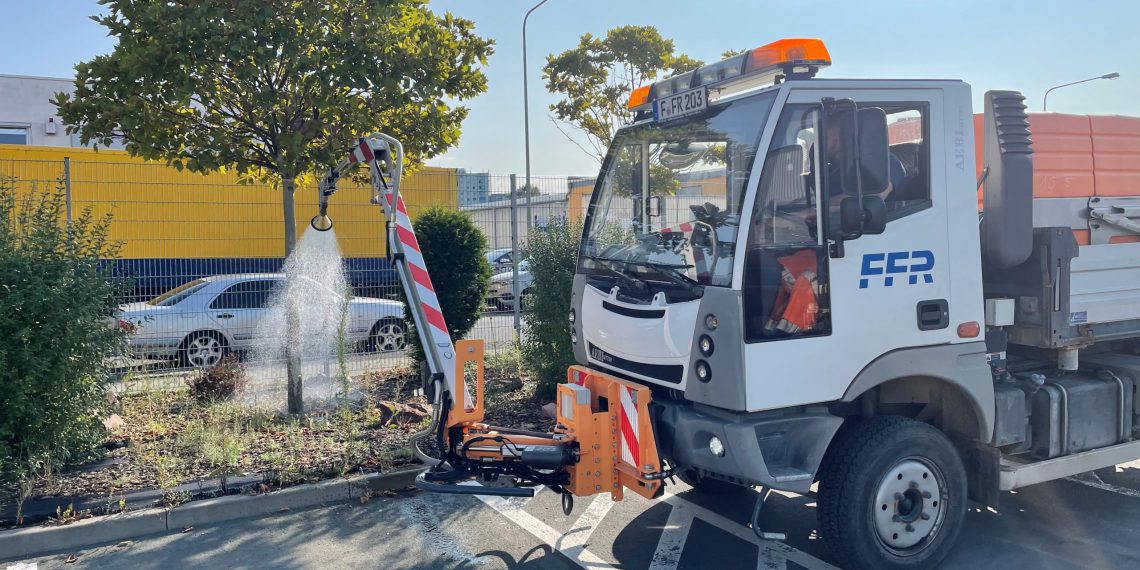Frankfurt wants to become a pioneer in water-saving irrigation of city trees: The city could potentially use around a thousand cubic meters less water in the future by optimizing irrigation processes for young urban trees. This is the first interim result of the “Smart Irrigation” pilot project, which researchers at the University of Hohenheim in Stuttgart are conducting together with FES Frankfurter Entsorgungs- und Service GmbH and other project participants. An intelligent measuring and computer system records the current water supply of the trees. In the future, this could enable irrigation to be demand-oriented and digitally controlled.
In view of the increasingly hot and dry summers, the issue of water scarcity is also becoming more and more important in Germany. In large cities in particular, which already have to cover their water requirements from the surrounding countryside, sealed surfaces and falling groundwater levels are exacerbating the problem. In the summer months, this often leads to a lack of water supply for urban trees with serious consequences. According to press reports, several thousand trees in German cities die each year from lack of water.
Yet trees are crucial to a city’s microclimate and its air quality; not only do they provide shade, increase humidity, lower the ambient temperature and filter out dust and pollutants from the air. They also have a positive influence on the human psyche and contribute to the well-being of city dwellers.
Few studies on smart irrigation systems in cities
With climate change, more and more cities are turning to smart city concepts that use advanced information technologies to conserve scarce resources. Especially with regard to the water supply of urban trees, the installation of intelligent irrigation systems can be useful. This is shown by a research project of the University of Hohenheim and FES Frankfurter Entsorgungs- und Service GmbH in cooperation with the Frankfurt Green Spaces Office, the Frankfurt Palmengarten, IoT Concepts GmbH & Co KG, clickbar. GmbH, as well as the Project Group Business Informatics of the Fraunhofer FIT and the FIM Research Center.
Currently, in the city of Frankfurt, as in many other cities, trees are irrigated with a fixed amount of water according to a predetermined schedule. According to experts, this rigid watering schedule can lead to overwatering of some species and opens up the potential for water savings. In addition, contracted service providers sometimes use potable water for competitive reasons, even though the city’s Parks Department provides several process and stormwater sources citywide that could be used for irrigation services. In a model project, the research team is working with the city government, IT specialists and botanists to investigate how to design a smart irrigation system for urban trees.
“A variety of smart irrigation methods already exist in the agricultural sector. However, studies that examine what smart irrigation systems can look like in urban settings are scarce. To our knowledge, our study is among the first to propose a design for a smart irrigation system for urban trees.”
- Dr. Valerie Graf-Drasch, postdoctoral researcher in the Department of Digital Management at the University of Hohenheim
Intelligent irrigation system will determine water requirements in the future
In order to minimize water losses, an intelligent irrigation system must determine the water requirements of the plants as accurately as possible and ensure an optimal water supply. To this end, small measuring devices equipped with a transmitter were inserted into the soil of eight young ash trees in the trial. This is because freshly planted, young trees are particularly dependent on an adequate water supply.
Both soil moisture sensors and tensiometers are used. These record the so-called water potential of the soil. It indicates how much water is available to the plants at different depths and what force the trees needed to draw it from the soil.
The data is transmitted via a special city-owned radio network directly to a central computer, which in the future will use it to calculate the individual watering requirements of each tree. The goal is to no longer provide each tree with a predetermined amount of water across the board, but rather to determine the amount needed depending on the location and thus save water. “More research is needed before a smart irrigation system can automatically calculate individual water requirements from soil parameters and other parameters. Until then, however, the collected data will in any case help to support human experts,” emphasizes Florian Hawlitschek, Innovation Manager at FES.
The pilot project also confirms that this can succeed: an initial evaluation of the data collected shows that the trees studied actually had enough water available in April 2021 and were still irrigated. According to the researchers, an optimized irrigation scheme in the spring of this year could have reduced water consumption in German cities by several million liters.
Dr. Graf-Drasch points out, however, that these preliminary results should be interpreted with caution. In other years, the results could be different. “However, the results of this test show that a lot of water can be saved in the maintenance of urban green spaces. That’s because, conversely, our system also allows us to determine whether a tree has received too much water. Especially in times of aggravated water scarcity, this is an important finding. Digital and automated technologies can help us become better and more efficient at protecting the environment in the future. However, instead of fixed routes and water quantities, more flexibility will then be required.”

















